Marty Halpern's Blog, page 21
June 8, 2015
"The pace of the novella is never less than breakneck": a review of Slow Bullets by Alastair Reynolds
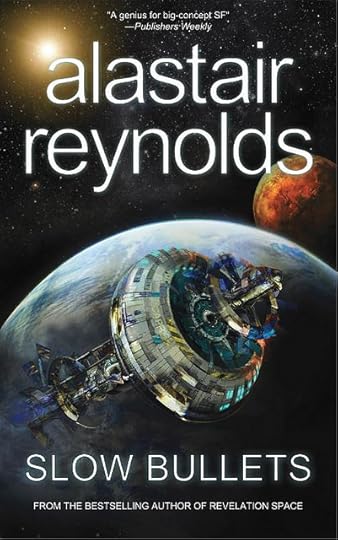 If you are unfamiliar with the various works of author Alastair Reynolds, then
Slow Bullets
If you are unfamiliar with the various works of author Alastair Reynolds, then
Slow Bullets
 would be the perfect starting point. If you read Alastair Reynolds already, preferring his longer novels and series work -- still, don't deny yourself the pleasure of reading this story, as Slow Bullets has more ideas than some novels that are twice its length.
would be the perfect starting point. If you read Alastair Reynolds already, preferring his longer novels and series work -- still, don't deny yourself the pleasure of reading this story, as Slow Bullets has more ideas than some novels that are twice its length.If you have any hesitations whatsoever about reading this story, read Richard Dansky's review in The Green Man Review:
Wars do not end neatly. While treaties may be signed and victories declared, there's always room around the edges and in the grey spaces away from cameras and central command for those more interested in brutality than resolution.
Such is the starting premise of Alastair Reynolds' novella Slow Bullets, which puts protagonist Scur in the entirely illegal clutches of a brutal enemy soldier. The ancient war the two have been fighting on opposite sides of is over, but on the ground that doesn't matter—Scur is captured, tortured, and left for dead with the ticking time bomb of a second "slow bullet"—a combination internal hard drive and dog tag implanted in every soldier—injected into her. Tougher than her captor thinks, Scur cuts out the second bullet, but that merely sets up the real conflict.
Scur later awakens onboard a giant transport vessel, prematurely awakened from hibernation, or so she thinks. The ship itself is in trouble, filled with a mix of war criminals, soldiers from both sides, and confused and terrified crew. It's also arrived a little late, as the green and lush planet it was supposed to arrive at after the war—now a dim and distant memory—appears to be undergoing an ice age, the sort of development that rarely occurs overnight.
The story has all the components of a classic disaster scenario, especially once Scur spots the man who captured her among the faction-riddled passengers. In lesser hands, that's perhaps what it could have been, with Scur and her nemesis pursuing each other across the wounded ship until there was some sort of climactic confrontation, preferably backlit with explosions. But Reynolds doesn't take the easy way out. Rather, the obvious conflict is contextualized, with the bigger problems—what's wrong with the ship, what can be done about it, how can groups of people for whom war is still fresh in their recently unfrozen minds be drawn to work together—taking center stage and the personal conflict viewed more as a threat to bigger, fragile solutions.
The pace of the novella is never less than breakneck, even if the incidents being discussed don't fit neatly into conventional action beats. Reynolds sketches the evolution of this unconventional, highly combustible society with a sure hand, eliding unnecessary detail while laying out the key components in stark detail. There's no wasted space here, no digressions into pointless technobabble or infodump for the sake of showing off the world building. Indeed, even the slow bullets of the title get described as much by implication as by exposition, which can lead an unwary reader to assume they've stumbled into a segment in an ongoing series. The fact that the ideas of the book are so big—the source and implications of the untimely ice age, the scale of the just-ended war, the questions of faith and memory and society that drive the action onboard ship—that it seems impossible for them to be given their due in something novella length. And yet Reynolds manages it while effortlessly sidestepping the more conventional questions one would expect him to have to answer—what happened to the ship, the larger details of the war—remain thoroughly sidelined. It is enough that things have happened, and Slow Bullets looks resolutely to the future instead of shoring up its universe's past.
At its core, Slow Bullets is a hopeful book, a cry against the darkness of seeming inevitable destruction. Scur and her shipmates, against all odds, manage to create something in the midst of a scenario primed instead for bloody destruction, and they give freely of themselves to do so. The greater good is ultimately affirmed as something worth striving and sacrificing for, even if the personal cost is high. But that doesn't mean it's a happy or cheerful book, rather just an eminently worthwhile one.

Published on June 08, 2015 17:27
June 2, 2015
Shirley Jackson Award Nominee: The Children of Old Leech Anthology
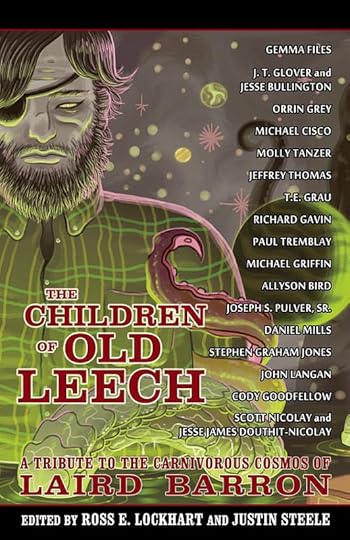 The Children of Old Leech
The Children of Old Leech
 was the brainchild of editors Ross E. Lockhart and Justin Steele, and published in hardcover by Word Horde in July 2014 (and recently reprinted in trade paperback). The subtitle to this anthology is the key to its content: "A Tribute to the Carnivorous Cosmos of Laird Barron" -- stories written in the worlds and playgrounds of dark fantasy/horror author Laird Barron.
was the brainchild of editors Ross E. Lockhart and Justin Steele, and published in hardcover by Word Horde in July 2014 (and recently reprinted in trade paperback). The subtitle to this anthology is the key to its content: "A Tribute to the Carnivorous Cosmos of Laird Barron" -- stories written in the worlds and playgrounds of dark fantasy/horror author Laird Barron.When I wrote about my work on TCoOL (April 14, 2014, blog post), I stated (and I quote): "I am confident that some of these stories will make their way onto the list of finalists for next year's Bram Stoker Awards and/or World Fantasy Awards." What I hadn't anticipated at the time was that the anthology itself would be nominated for the Shirley Jackson Award. My congratulations to all the 2014 Shirley Jackson Award nominees; you can read the list of all the finalists, and categories, on ShirleyJacksonAwards.org.
As I said, TCoOL was originally published in a hardcover edition. In fact, if you ordered the book direct from Word Horde prior to publication -- and were willing to spend a few bucks more -- you would have scored the deluxe edition, which came with a limited edition goodie (July 5, 2014, blog post). Which brings me to the fact that if you read -- and collect -- quality fiction, particularly dark fantasy and horror, then follow, friend, and stalk Word Horde because you'll want to get in on any future deluxe editions the press publishes.
Here is the contents list for The Children of Old Leech:
Introduction: Of Whisky and Doppelgängers — Justin SteeleThe Harrow — Gemma FilesPale Apostle — J. T. Glover & Jesse BullingtonWalpurgisnacht — Orrin GreyLearn to Kill — Michael CiscoGood Lord, Show Me the Way — Molly TanzerSnake Wine — Jeffrey ThomasLove Songs from the Hydrogen Jukebox — T.E. GrauThe Old Pageant — Richard GavinNotes for "The Barn in the Wild" — Paul TremblayFiredancing — Michael GriffinThe Golden Stars at Night — Allyson BirdThe Last Crossroads on a Calendar of Yesterdays — Joseph S. Pulver, Sr.The Woman in the Wood — Daniel MillsBrushdogs — Stephen Graham JonesYmir — John LanganOf a Thousand Cuts — Cody GoodfellowTenebrionidae — Scott Nicolay & Jesse James Douthit-NicolayAfterword — Ross E. Lockhart
As part of the promotion for TCoOL, Word Horde published mini excerpts from each of the stories over a span of several weeks. The first story excerpt is "The Harrow" by Gemma Files; at the bottom of the page you will find a link to the next story excerpt, and so on, through the entire contents list. So if you are unfamiliar with this anthology, then take advantage of these mini excerpts and give them a read.
Here's what Publishers Weekly had to say about The Children of Old Leech: A Tribute to the Carnivorous Cosmos of Laird Barron
 :
:Lockhart and Steele collect 17 original stories from some of the shining stars of modern horror, constructing a worm-riddled literary playground from elements of the fiction of horror maestro Laird Barron. The results come across with a coherent feeling of dread, without feeling derivative of the source. The Broken Ouroboros comes up in an academic study of a rural cult in Molly Tanzer's "Good Lord, Show Me the Way." The worms crawl in as tiny silkworms in J. T. Glover and Jesse Bullington's "Pale Apostle." Old Leech appears in the context of a hippie revival retreat in T.E. Grau's "Love Songs from the Hydrogen Jukebox." In Joseph S. Pulver, Sr.'s "The Last Crossroads on a Calendar of Yesterdays," the pages of the Black Guide become material for a golem built by a Jewish man driven insane from a childhood witnessing Nazi magic. A doppelganger of Barron himself features in a wonderfully creepy introduction by Steele. Hopefully Barron will enjoy this tribute; his fans certainly will. (July)—Publishers Weekly, 05/19/2014
The 2014 Shirley Jackson Awards will be presented on Sunday, July 12, 2015, at Readercon 26, in Burlington, Massachusetts.

Published on June 02, 2015 16:34
June 1, 2015
Alastair Reynolds on the Genesis of his story Slow Bullets
 Just the other day...well, actually, three days ago...I posted that the new novella by Alastair Reynolds --
Slow Bullets
Just the other day...well, actually, three days ago...I posted that the new novella by Alastair Reynolds --
Slow Bullets
 -- was now available for purchase. (The ebook should be available tomorrow, June 2, on Amazon, according to publisher Tachyon Publications.)
-- was now available for purchase. (The ebook should be available tomorrow, June 2, on Amazon, according to publisher Tachyon Publications.)As I've previously written (here and here), I first approached Al Reynolds about a novella for Tachyon Publications in April 2013. And now, just a bit over two years later, Slow Bullets has been published. The book itself didn't really take two years: Al had to first write the story, then the story had to be accepted and agreements signed, and then the work on editing and publishing the story begun. What I didn't know, until yesterday, is that this story had actually been in process, so to speak, for years.
On his blog Approaching Pavonis Mons by balloon, the author explains how two completely separate story ideas that had been gestating for years finally came together to form Slow Bullets.

Published on June 01, 2015 15:19
May 29, 2015
Now Shipping: Slow Bullets by Alastair Reynolds
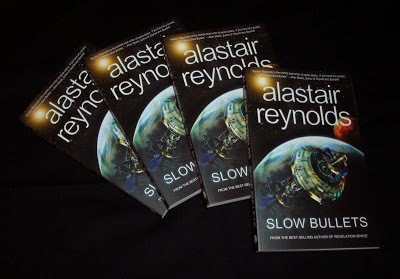
On April 2, 2013, I contacted author Alastair Reynolds via email (I live in California, Al resides in the U.K.): I mentioned Tachyon Publications and that I had personally worked on some of the press's recent award-winning novellas (Nancy Kress's After the Fall, Before the Fall, During the Fall and Brandon Sanderson's The Emperor's Soul). I knew that Al was in the middle of a trilogy of novels, but I also knew that in between novels he enjoyed writing short fiction (to cleanse the palate, as it were). So, I told him that should he find the time and inspiration to write a stand-alone novella, to please keep me and Tachyon Publications in mind.
Al responded the very next day, stating that he was about 20,000 words into a new novella that as yet had no home. Al also told me that he had not set himself any deadline for the completion of the novella, but when he did complete the story he would be sure to let me see it.
The rest, as they say, is history.
My comp copies of Slow Bullets
 arrived this past week. As I said, this project officially began on April 2, 2013, with that email to Al Reynolds -- and to finally hold the published book in hand provides me (and I'm sure Al himself and the folks at Tachyon Pubs) with a great sense of completion, of accomplishment.
arrived this past week. As I said, this project officially began on April 2, 2013, with that email to Al Reynolds -- and to finally hold the published book in hand provides me (and I'm sure Al himself and the folks at Tachyon Pubs) with a great sense of completion, of accomplishment.You can read the details of how Slow Bullets came to be in my February 9, 2015, blog post entitled "Editing in Process...Slow Bullets by Alastair Reynolds." If you would like to request an ebook review copy of Slow Bullets, please read my March 16 blog post.
Here are a pair of blurbs for Slow Bullets from a pair of Michaels, just to whet your appetite:
Slow Bullets is classic science fiction, a space opera, a puzzle story, a character study, visionary science fiction, and a prayer for peace. I see no reason why you should not love it.
~ Michael Swanwick
Alastair Reynolds' new novella Slow Bullets has the scope of a much longer work (Edward Gibbon's The Decline and Fall of the Roman Empire, say), the literary speed of the most rapidly hurtling bullet, and so many provocative scientific and/or philosophical ideas that even Stephen Hawking’s head might well spin with them. Moreover, Reynolds artfully compresses all these disparate elements into a portable trade paperback or a weightless e-file, the better to accommodate our busy reading habits and the more fully to entertain us.
Let me also note that Slow Bullets posits a far-future situation akin to the one that we confront on planet Earth today, but leavens this fictional crisis with a hard-won grasp of human psychology and a down-to-the-ground optimism that bestows on its readers reasons for supposing our "damned human race" nimble enough to overcome our demanding real-world crisis du jour. A fine example of the true science fictionist's art..."with a bullet," as the editors at Billboard Magazine used to say.
~ Michael Bishop

Published on May 29, 2015 15:23
May 27, 2015
Book Received: Michael J. Sullivan's Hollow World
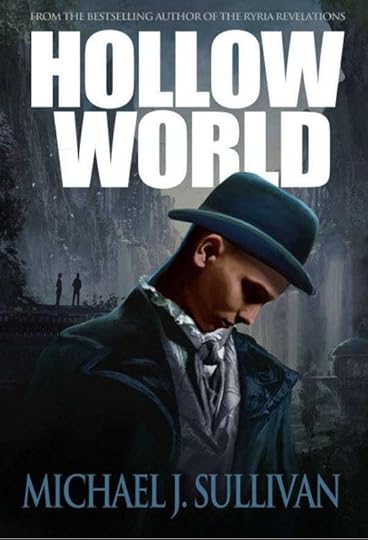 When I complete work on a project, I store a file box copy of the marked up manuscript (and yes, I still work on hardcopy) until I have a physical copy of the published book in hand. Up to that point, the author and/or the publisher may have a question or issue with one or more of my edits and, if necessary, I can refer back to the marked up manuscript. However, once I have a copy of the published book, any question or issue at that point is moot, and I will then recycle my copy of the marked up manuscript. The only exception to this would be if the book were part of a series -- and I plan to (or at least hope to be able to) work on subsequent volumes. I then retain the marked up manuscript for reference in my commitment to maintain consistency throughout the entire series.
When I complete work on a project, I store a file box copy of the marked up manuscript (and yes, I still work on hardcopy) until I have a physical copy of the published book in hand. Up to that point, the author and/or the publisher may have a question or issue with one or more of my edits and, if necessary, I can refer back to the marked up manuscript. However, once I have a copy of the published book, any question or issue at that point is moot, and I will then recycle my copy of the marked up manuscript. The only exception to this would be if the book were part of a series -- and I plan to (or at least hope to be able to) work on subsequent volumes. I then retain the marked up manuscript for reference in my commitment to maintain consistency throughout the entire series.So a while back I was going through stacks (and I mean stacks -- I work on a lot of series!) of manuscript boxes and I came upon the marked up manuscript for Hollow World
 by Michael J. Sullivan.
by Michael J. Sullivan.I recalled a dinner meeting with Jacob and Rina Weisman, of Tachyon Publications, on Saturday, July 6, 2013, while attending Westercon 66 in Sacramento. It was during this dinner meeting that Jacob brought me up to speed on the forthcoming Hollow World project. So I checked my notes/invoice and found that I had completed work on this 385-page, 107,000-word novel in October 2013. I then checked the book's pub date on Amazon.com: April 15, 2014 -- and here it is a year later!
Since Tachyon Publications has never not sent me a comp copy of a book I worked on, the book must have been lost in transit -- and being busy with project after project, and stacks, as I said, of manuscript boxes -- I hadn't realized that I never received a copy of the published book, until recently. So I sent off an email to Tachyon requesting a copy of Hollow World...and the book is now in hand.
Hollow World is a time travel novel -- but it is not a novel about the science of time travel. In fact, as Sullivan states in his Author's Note at the beginning of the book:
In the classic The Time Machine, H. G. Wells's high-tech explanation for how his device was able to skip through years was: "Now I want you to clearly understand that this lever, being pressed over, sends the machine gliding into the future, and this other reverses the motion." That's pretty much the extent of his hard science. Of course his story, while named The Time Machine, really wasn't so much about the machine or the science behind it, but rather speculations on the future of mankind.The author goes on to state in his Author's Note:
So is Hollow World.
I did research into time-travel theory, and I drew inspiration from a handful of sources, most notably Time Travel in Einstein's Universe: The Physical Possibilities of Travel Through Time by renowned astrophysicist J. Richard Gott. Mr. Gott provided a plausible explanation for how a stationary object could move significantly forward in time by overcoming the g-force restriction of linear travel by moving interdimensionally.... That's the theory, but as I said, time travel of the sort required for this story isn't possible—at least not in an urban garage.... I felt providing a good reading experience superseded an adherence to strict probability.
So, if Hollow World isn't about the science of time travel, then what is the story about? Here's an excerpt from a fairly lengthy review by N. E. White on SFFWorld.com:
Hollow World begins with Ellis Rogers being told he is going to die of idiopathic pulmonary fibrosis and he laughs. No, he's not a crazy old man. He just knows something his doctor doesn't: he's got a time machine sitting in his garage. Thus begins Ellis' journey into a future that is both frightening (to him) and awesome (in the true sense of that word).
...
While the story in Hollow World may seem deceptively simple and some may find Ellis naive in his attitudes towards sexual alternatives and deities, Mr. Sullivan has painted very realistic characters. Characters that ring so true, they reminded me of colleagues and neighbors who abhor the very idea of tolerating an open society, let alone living in a world where the very morals they uphold simply wouldn't make sense. With surprisingly familiar, clear, and poignant (sometimes even funny) language, Mr. Sullivan shows us a world where many of the problems we face today have been eliminated – showing the absurdity of our views. But he also shows us why we hold those views so closely to our hearts.

Published on May 27, 2015 13:29
May 17, 2015
B. B. King on Sesame Street: The Letter B
In Memory of Riley B. King (September 16, 1925 – May 14, 2015)

Published on May 17, 2015 13:38
May 14, 2015
Book Received: Hannu Rajaniemi: Collected Fiction
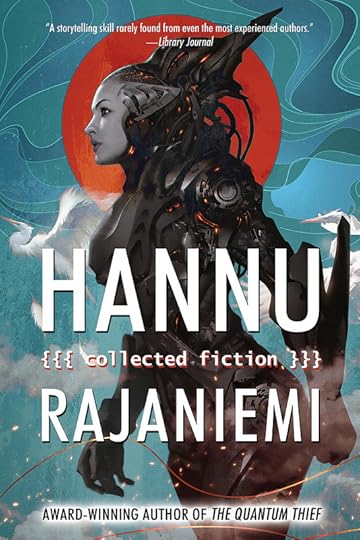 Cover art by Lius LasahidoThe colophon on the last page of this book reads:
Cover art by Lius LasahidoThe colophon on the last page of this book reads:This limited edition of 2,000 copies has been bound for Tachyon Publications by Maple Press. The cover illustration is a re-creation of Lius Lasahido's "Raturion," which was commissioned from Lasahido specifically for this edition by the publisher.The point here being that if you wish to add a hardcover edition of Hannu Rajaniemi: Collected Fiction
 to your library, you had best make haste with that order because 2,000 copies won't be available for very long. To put 2,000 copies in perspective: Sasquan, the 73rd World Science Fiction Convention (WorldCon) to be held in Spokane, Washington, on August 19-23, 2015, currently has over 8,000 members.
to your library, you had best make haste with that order because 2,000 copies won't be available for very long. To put 2,000 copies in perspective: Sasquan, the 73rd World Science Fiction Convention (WorldCon) to be held in Spokane, Washington, on August 19-23, 2015, currently has over 8,000 members.So, if you don't score a hardbound copy, don't say I didn't warn you....
You can read my February 18 blog post in which I write about my work on Rajaniemi's Collected Fiction. The collection contains nineteen stories and approximately 80,000 words. Three of the stories are original to the collection: "Ghost Dogs," "The Haunting of Apollo A7LB," and "Skywalker of Earth."
"Nano-jacked super-beings, carnivorous emergent technologies, the doors of perception yanked wide and almost off their hinges….Hannu Rajaniemi has a deserved reputation as the very hardest of Hard SF writers, but his range is far wider and far warmer. From stories of tech-driven future nightmare to eerie Finnish mythscapes rewired, quirky surreal mood pieces and experimental fiction genuinely worthy of the name, Rajaniemi writes fiction coded for the bleeding edge of modernity and yet rooted in age-old human imperatives; at the beating heart of these tales is a single concept—the ache of the human heart and the courage it takes to live with it, in this era or any other. So if you thought Hard SF was sterile stuff, lacking in human affect, think again—put the barrel of Rajaniemi’s fiction in your mouth and blow your mind."—Richard Morgan, author of Altered Carbon and The Dark Defiles

Published on May 14, 2015 12:07
May 9, 2015
Locus Award Nominees: Daryl Gregory and Nancy Kress
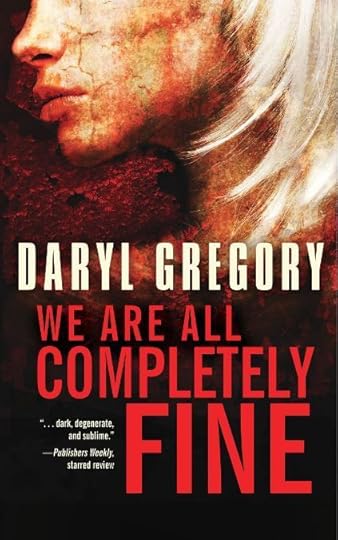 This past Monday, May 4, the finalists were announced for the 2015 Locus Awards -- and I'd like to take this opportunity to congratulate all the nominees in all categories. You can review the complete, Sad/Mad/Rabid Puppies-free list of nominees online at LocusMag.com.
This past Monday, May 4, the finalists were announced for the 2015 Locus Awards -- and I'd like to take this opportunity to congratulate all the nominees in all categories. You can review the complete, Sad/Mad/Rabid Puppies-free list of nominees online at LocusMag.com.However, amongst all those nominees are two authors, in the "best novella" category, whom I especially wish to acknowledge: Daryl Gregory and Nancy Kress. I was involved in the production of these two books from Tachyon Publications, and I have to hope that my work had, even in some small way, contributed to this success.
In my February 27, 2014, blog post, I wrote of my work on Daryl Gregory's novella, We Are All Completely Fine
 . When I wrote that blog post more than a year ago, I wrote (and I quote): "...we'll be seeing this sharp-edged story on many awards lists beginning in early 2015." And, as I had predicted, We Are All Completely Fine has been nominated for the Nebula Award and the Shirley Jackson Award, in addition to the Locus Award. (And I won't speak any further about the Hugo Awards.)
. When I wrote that blog post more than a year ago, I wrote (and I quote): "...we'll be seeing this sharp-edged story on many awards lists beginning in early 2015." And, as I had predicted, We Are All Completely Fine has been nominated for the Nebula Award and the Shirley Jackson Award, in addition to the Locus Award. (And I won't speak any further about the Hugo Awards.)Here's an excerpt from the fairly lengthy Publishers Weekly review:
"This complex novel—scathingly funny, horrific yet oddly inspiring—constructs a seductive puzzle from torn identities, focusing on both the value and peril of fear. When enigmatic Dr. Jan Sayer gathers survivors of supernatural violence for therapy, she unwittingly unlocks evil from the prison of consciousness....Blending the stark realism of pain and isolation with the liberating force of the fantastic, Gregory makes it easy to believe that the world is an illusion, behind which lurks an alternative truth—dark, degenerate, and sublime."–Publishers Weekly Starred Review
 The second novella is
Yesterday's Kin
The second novella is
Yesterday's Kin
 by Nancy Kress, which I wrote about in my April 1, 2014, blog post. As with the Gregory novella, more than a year ago, I wrote: "So when I was called upon to copy edit the new, forthcoming novella, Yesterday's Kin, I knew that I would be working on another potential award-winning story." And, once again, Yesterday's Kin has also been nominated for the Nebula Award as well as the Locus Award.
by Nancy Kress, which I wrote about in my April 1, 2014, blog post. As with the Gregory novella, more than a year ago, I wrote: "So when I was called upon to copy edit the new, forthcoming novella, Yesterday's Kin, I knew that I would be working on another potential award-winning story." And, once again, Yesterday's Kin has also been nominated for the Nebula Award as well as the Locus Award.Now you might be thinking that I say this about every project that I work on, but if you read this blog regularly, you would know that that's not true. In fact, I rarely boast about my projects being award worthy. In addition to these two novellas, the only other project that I recall making such a prediction was for the anthology The Children of Old Leech: A Tribute to the Carnivorous Cosmos of Laird Barron
 , edited by Ross E. Lockhart and Justin Steele and published by Word Horde. The anthology, by the way, is also a finalist for the Shirley Jackson Award, but that's for another blog post. So, for 2014, I'm three for three.
, edited by Ross E. Lockhart and Justin Steele and published by Word Horde. The anthology, by the way, is also a finalist for the Shirley Jackson Award, but that's for another blog post. So, for 2014, I'm three for three.Nancy Kress and Tor.com have graciously posted an excerpt from Yesterday's Kin. The story is told from two alternating points-of-view, that of geneticist Marianne Jenner, and her youngest son Noah. This excerpt is from Marianne's POV.
And here's a snippet from the lengthy Kirkus review:
"The political turmoil created by Kress' aliens is a warning for the reader to pay more attention to how modern-day conflicts are handled.Science-fiction fans will luxuriate in the dystopian madness, while even nonfans will find an artful critique of humanity's ability to cooperate in the face of a greater threat."–Kirkus Reviews
Last, but certainly not least, a few words from a Hugo Award-winning editor:
"Nancy Kress delivers one of the strongest stories of the year to date…. As with all of Kress’s work, this is very nicely crafted, with well-paced prose that carries you through the story, complex human characters, a compelling and conflict-driven human story, a clever twist partway through, and an even cleverer twist at the end."–Gardner Dozois, editor of The Year's Best Science Fiction series

Published on May 09, 2015 09:57
May 6, 2015
Some Words from Singer-Songwriter Tom Waits
Published on May 06, 2015 09:46
May 5, 2015
Editing in Process: In the Stars I'll Find You by Bradley P. Beaulieu
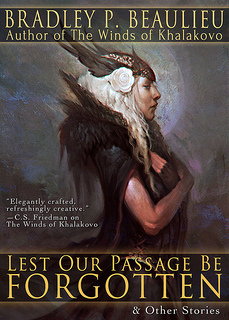 In late 2012, author Bradley P. Beaulieu (pronounced "Bowl-yer") launched a Kickstarter campaign in order to self-publish a short story collection. The collection, entitled
Lest Our Passage Be Forgotten & Other Stories
In late 2012, author Bradley P. Beaulieu (pronounced "Bowl-yer") launched a Kickstarter campaign in order to self-publish a short story collection. The collection, entitled
Lest Our Passage Be Forgotten & Other Stories
 , was successfully funded by the end of January 2013 -- and I had the pleasure of working with Brad on the editing of this collection. You can read my blog post of April 22, 2013, on this project, if you wish.
, was successfully funded by the end of January 2013 -- and I had the pleasure of working with Brad on the editing of this collection. You can read my blog post of April 22, 2013, on this project, if you wish.Two years later, on December 1, 2014, Brad and five other authors launched a new Kickstarter campaign -- "Six by Six: A New Kind of Spec-Fic Anthology" -- in which six authors each provided a collection of six stories. This Kickstarter was a rather unique idea involving, as I said, six authors (including Will McIntosh and Martha Wells), and was fully funded along two stretch goals by the end of December.
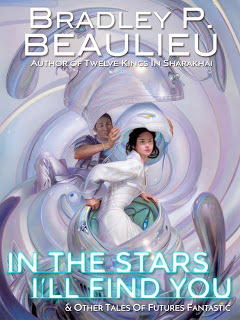 After Brad met his "Six by Six" Kickstarter goals and rewards, he then combined those six stories with four additional stories -- and put together a second collection of short stories: In the Stars I'll Find You & Other Tales of Futures Fantastic, which he also plans to self-publish.
After Brad met his "Six by Six" Kickstarter goals and rewards, he then combined those six stories with four additional stories -- and put together a second collection of short stories: In the Stars I'll Find You & Other Tales of Futures Fantastic, which he also plans to self-publish.Brad was fortunately satisfied with my work on Lest Our Passage Be Forgotten (You can read the author's acknowledgement in the first collection here.) because I was given the opportunity to work on this second collection as well.
As with the first collection, I performed a developmental review of the four new, previously unpublished stories:
"And a Girl Named Rose" (5,100 words)Then, after Brad had reworked these stories as necessary, he pulled together the full collection of ten stories -- approximately 83,000 words of fiction -- and I did my line and copy editing thing. Even though I had already reviewed the four new stories, including them in the overall copy edit allowed me to catch any new errors that might have been introduced during the rework, plus I could then ensure consistency in word usage and such throughout the entire collection.
"Born of a Trickster God" (16,900 words)
"Compartmentalized" (6,400 words)
"In the Stars I’ll Find You" (9,400 words)
So, in addition to the four new stories above, the collection includes these six published stories (also in alphabetical order):
"Bloom" - first published in Realms of Fantasy, June 2008
"Chasing Humanity" - first published in Man vs. Machine, November 2006
"Flashed Forward" - first published in Help Fund My Robot Army, edited by John Joseph Adams, 2014
"No Viviremos Como Presos" - first published in Orson Scott Card’s Intergalactic Medicine Show, October 2007
"Quinta Essentia" - first published in Clockwork Universe - Steampunk vs. Aliens, edited by Patricia Bray and Joshua Palmatier, 2014
"Upon the Point of a Knife" - first published in The Crimson Pact, Volume V, edited by Paul Genesse, 2013
The original sources for these six stories are quite varied -- anthologies and magazines -- and since most readers don't have access to such a variety of publications, a collection of Brad's short fiction is the best way to read these stories. In the Stars I'll Find You will be published in both print and electronic editions later this year.
With these two collections, I've now read twenty-seven stories...and what continues to impress me with each new story is the breadth of content -- and the storytelling: from a medical procedure on a man's brain so he can control individual actions and memories ("Compartmentalized") to the relationship between a ship's AI and a young girl ("A Girl Named Rose") to unlocking the secrets of the fifth element ("Quinta Essentia").
I would recommend that you connect with Bradley P. Beaulieu: the author's website has links to Facebook, Twitter, G+, etc. so that you can stay informed of his activities, as I know he'll let his readers know when the new collection will be officially released.

Published on May 05, 2015 16:55





